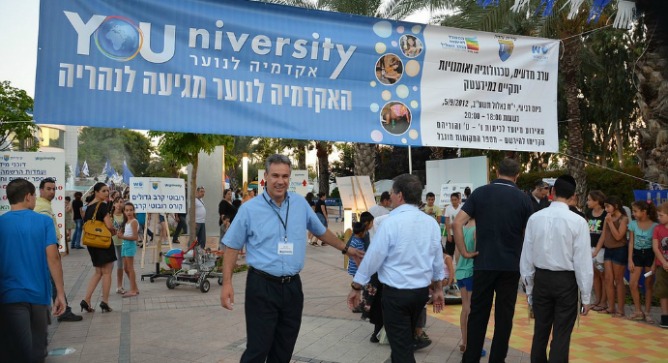Israeli Knesset member and Minister for the Development of the Negev and Galilee Silvan Shalom had a tough childhood in one of Beersheva’s poorest neighborhoods. His father was murdered during a botched burglary when Silvan was only seven, leaving his mother with eight children.
Shalom’s success story – one that took him all the way to the vice premiership in the current government – is the source and inspiration for a $4 million project to bring cutting-edge extracurricular education to middle-school kids from underprivileged backgrounds.
Spread the Word
• Email this article to friends or colleagues
• Share this article on Facebook or Twitter
• Write about and link to this article on your blog
• Local relevancy? Send this article to your local press
Launched this fall, YOUniversity is backed by Shalom’s ministry and World ORT. ISRAEL21c spoke to the project’s general manager, Ido Horresh, about why YOUniversity focuses exclusively on children from development towns.
“The Nobel laureate Arthur Kornberg once said ‘not everyone can be a great scientist, but a great scientist can come from anywhere,’” quotes Horresh. “I am convinced that the most brilliant, freshest new minds in Israeli science are going to come from the periphery, from places like Dimona, Safed, Kiryat Gat, Nahariya and Nazareth.”
Those are the five cities where YOUniversity is operating its after-school science and technology enrichment classes. The science element fits in with World ORT’s vision – the organization has been providing vocational and technical training for over 130 years and now operates in more than 60 countries – as well as with Horresh’s own background as a professor and researcher in human genetics at the Weizmann Institute of Science.
“There’s no question that the future of the state of Israel has to do with science education,” Horresh, 40, says emphatically. “There’s a real brain drain in science happening now. If we want to keep this motor running, we have to invest in education at a young age.”
Hands-on education
And the education has to be fun. To that end, there are no grades and very little frontal teaching in YOUniversity classes; it’s all about hands-on experience. For example, in the “Young Doctors” class, offered at all five YOUniversity campuses, students dissect pig hearts, take field trips to local hospitals and practice putting casts on each other. “Without actually breaking any arms, of course,” Horresh adds quickly.
The popular “CSI” (Crime Scene Investigation) course teaches genetics by allowing its young participants to collect evidence, including fingerprints and DNA samples from hair fibers planted by the teacher beforehand.
Classes are kept small – no more than 20 per group – as are costs. A token fee of less than $100 per class is charged for a full year, with scholarships available. If two siblings sign up, tuition is halved; for three or more, it’s free.
“We do charge a ‘seriousity’ fee,” Horresh comments. By that, he means students have to commit to attending class “even if the weather is bad or they have a big test the next day.”
The model seems to be working. Some 3,000 seventh- through ninth-graders are enrolled. In Nahariya, there are 600 students and a waiting list with another 300. Students are accepted based on a personal interview and recommendations. Each location employs about 20 instructors from the local community.
Horresh has used his academic connections to forge some powerful partnerships for teaching and supervision, including with his former employer, the Weizmann Institute, as well as the Technion, Ben-Gurion University of the Negev and the Shenkar College of Engineering and Design. The latter developed the curriculum for YOUniversity’s popular architecture course. Other cool courses include food design, oceanography, website building, applied physics and robotics.
Committed for the next two decades
In the process of establishing YOUniversity, Horresh and his team made some interesting discoveries. The opening of Bar-Ilan University’s medical school in Safed has created a high demand for anything medical up north, while Kiryat Gat kids can’t get enough of electronics and computer science, in part because of the large local Intel plant. Dimona’s kids, in the Negev Desert, are fascinated by environmental technology.
The first five development towns that signed on had to provide a physical space for the classes and commit to supporting the project for 20 years, Horresh says. “I don’t know if there’s a word in Hebrew for ‘sustainability.’ But it’s very important. If you go into something as just a short-term project, it’s almost always destined to become a fiasco.”
World ORT and Shalom’s ministry have committed to fund the first two years only. However, Horresh points out that World ORT is known as much for its ability to fundraise as its expertise in vocational training, so he’s not concerned. YOUniversity is also set to expand at the end of the initial period to other needy Israeli communities.
The YOUniversity campus in Nazareth, Horresh points out, is in the Arab part of town and classes are taught in Arabic. He hopes to try a mixed Jewish-Arab class in robotics in the coming semester, but says that language, especially at the age of students in YOUniversity, can be a significant barrier.
Language differences aside, YOUniversity students sometimes will collaborate with their counterparts overseas. For example, students in local “Space Clubs” will teleconference with other Space Club members at World ORT centers in Argentina and India.
Closer to home, the Space Clubs of Israel will meet for Ilan Ramon Day in February with US astronaut Gary Reisman.
That’s about as hands on as you can get for a Space Club without actually blasting off. Clearly, Israel’s YOUniversity is charting an impressive trajectory which, if Ido Horresh is right, is already launching the careers of Israel’s next science and technology leaders.














